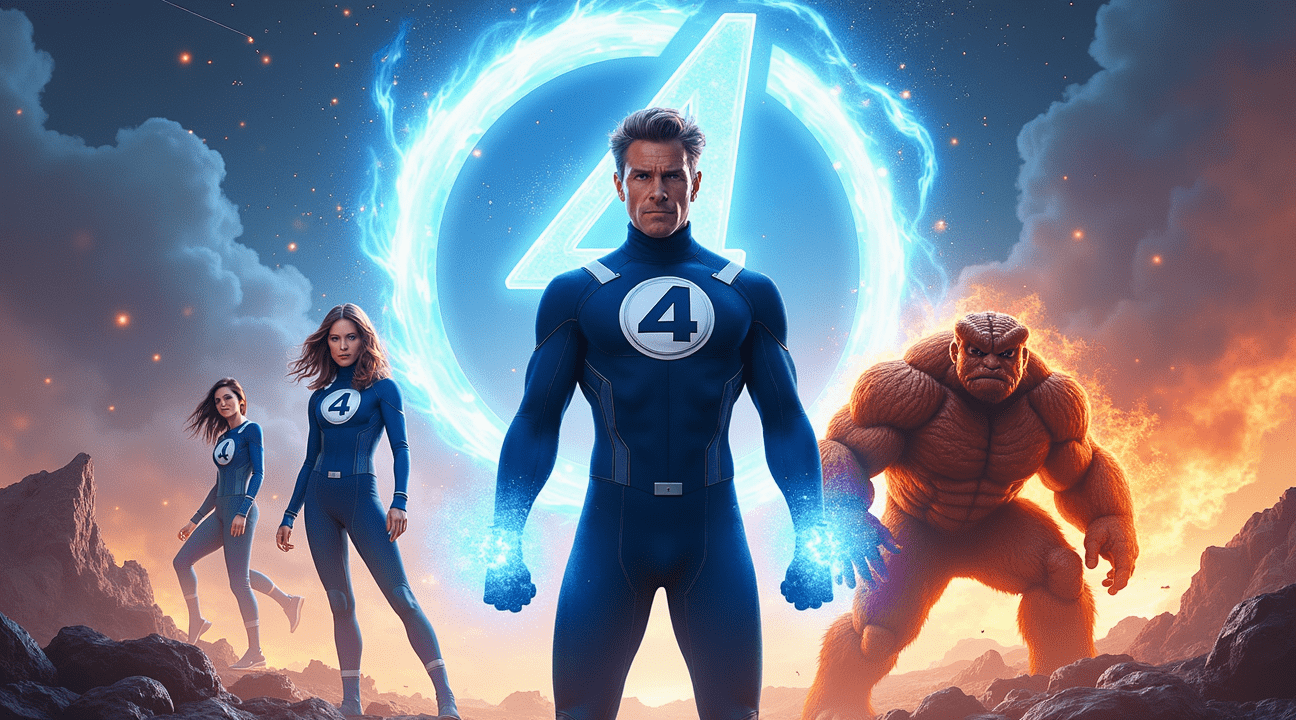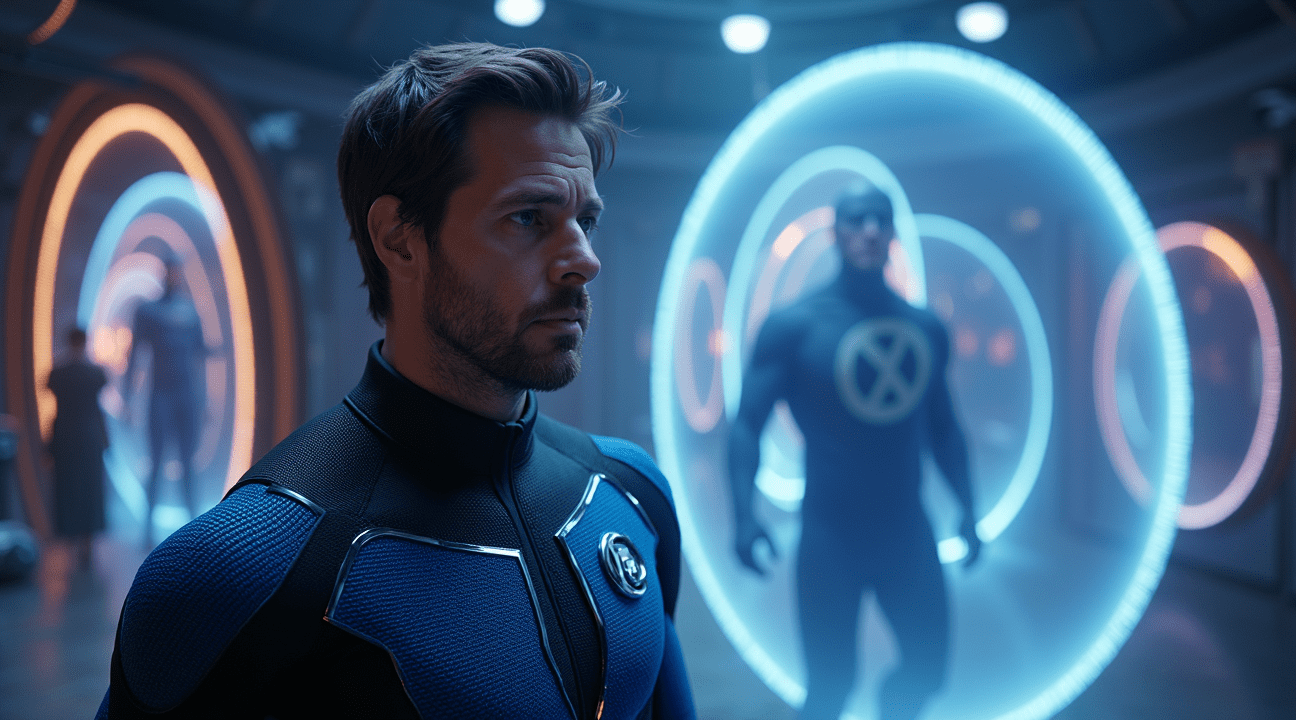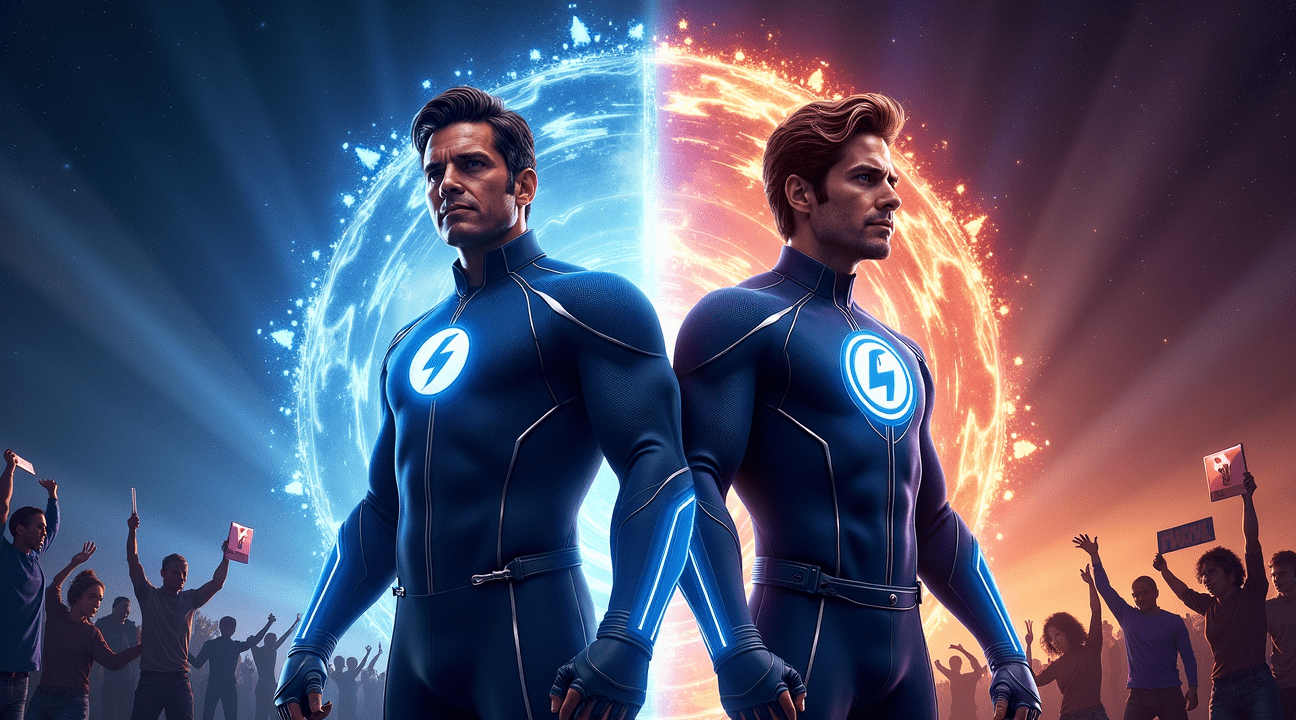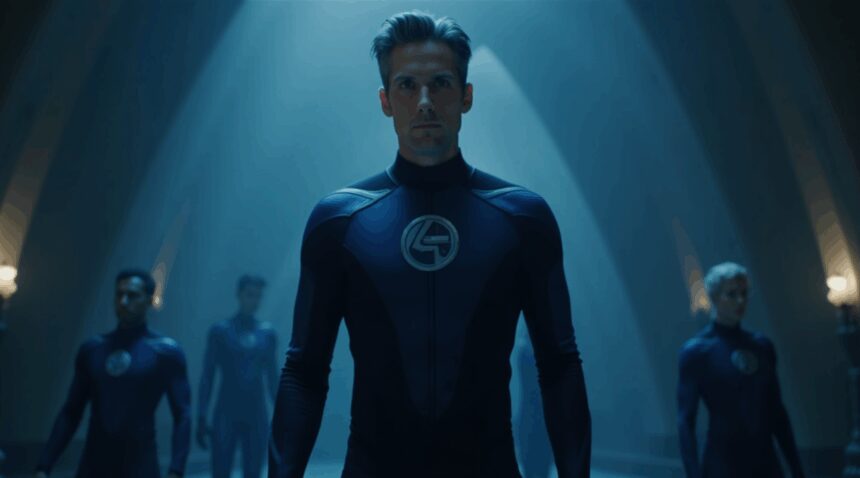John Krasinski’s cameo as Reed Richards in “Doctor Strange in the Multiverse of Madness” was a long-awaited moment for fans, but the Marvel Cinematic Universe (MCU) has since taken a different direction for its main timeline portrayal of the character.
John Krasinski’s Multiverse Reed Richards
Director Sam Raimi clarified that John Krasinski’s appearance as Reed Richards was intended as a temporary fan service moment rather than a stepping stone for future casting. His brief role fulfilled longtime fan desires but did not indicate commitment from Marvel Studios for further involvement in the franchise.
Pedro Pascal Cast as the Official Reed Richards
Marvel Studios has officially cast Pedro Pascal as the Earth-616 version of Reed Richards for the upcoming 2025 film, “The Fantastic Four: First Steps.” Alongside Pascal, a new ensemble cast has been introduced, marking a definitive fresh start for Marvel’s iconic super-team within the MCU.
Factors Behind the Casting Decision
- Scheduling conflicts played a significant role in preventing Krasinski from continuing the role long-term.
- Marvel required actors with multi-year availability for sustained storytelling over several phases.
- Creative direction and the desire for a specific dynamic influenced the decision to go with a different actor.
Ongoing Fan Campaigns
Despite Marvel’s casting of Pascal, dedicated fans have continued to advocate for Krasinski’s return by invoking the MCU’s expansive multiverse structure. These campaigns propose that he could reprise the role as an alternate version of Reed Richards in future films or series.
Multiverse Possibilities
- The MCU’s multiverse provides canonical flexibility to explore different versions of the same character.
- Fan campaigns gain traction on social media platforms, showcasing art and petitions supporting Krasinski’s alternate-universe return.
- Marvel Studios has already introduced multiple Lokis, Spider-Men, and Dr. Stranges, laying the groundwork for similar multiversal explorations with Reed Richards.
Marvel’s Vision Moving Forward
While the multiverse framework keeps fan hopes alive, Marvel Studios appears resolute in establishing Pascal’s version as the definitive Reed Richards. The approaching release of “The Fantastic Four: First Steps” signals the studio’s commitment to a cohesive and forward-looking portrayal of the iconic superhero team.
John Krasinski’s Brief But Memorable MCU Debut as Reed Richards
John Krasinski’s appearance as Reed Richards in Doctor Strange in the Multiverse of Madness delivered one of the most satisfying fan service moments in recent MCU history. The 2022 film showcased Krasinski as Mister Fantastic in what many considered a perfect piece of alternate universe casting. Years of passionate fan campaigns finally materialized when audiences saw the beloved Office star stretch his way onto the big screen as the brilliant scientist leader of the Fantastic Four.
Director Sam Raimi made it clear that John Krasinski’s casting wasn’t accidental or coincidental. Raimi confirmed that the decision stemmed directly from overwhelming fan support, acknowledging that Krasinski represented the dream version of Reed Richards for countless Marvel enthusiasts. The casting choice validated years of social media campaigns and online speculation that positioned Krasinski as the ideal candidate for the elasticity-powered superhero role.
Fan Campaigns That Made Marvel Listen
The groundswell of support for Krasinski began building momentum across various social platforms, with fans consistently pointing to his combination of intelligence, leadership qualities, and natural charisma. His previous work in The Office demonstrated his ability to balance humor with emotional depth, while Jack Ryan showcased his capacity for action-oriented roles. These performances convinced audiences that he possessed the perfect blend of scientific intellect and heroic presence that Reed Richards demands.
Marvel Studios rarely bows to fan pressure when making casting decisions, making Krasinski’s inclusion particularly significant. The studio’s acknowledgment of fan desires through this casting choice demonstrated their willingness to incorporate community feedback into creative decisions, even if temporarily.
A Brief Appearance With Lasting Impact
Krasinski’s screen time as Reed Richards lasted only minutes before the character met his demise at the hands of Wanda Maximoff. This swift elimination served multiple narrative purposes within the multiverse framework. The death sequence emphasized the alternate universe nature of the appearance while maintaining flexibility for future casting decisions in the main MCU timeline.
The brief appearance allowed Marvel to test audience reactions without committing to a long-term casting choice. Krasinski’s performance delivered the intellectual confidence and leadership presence that defines Reed Richards, giving fans a taste of what could be while keeping future options open. His portrayal balanced the character’s scientific brilliance with the warmth and relatability that made him a fan favorite choice.
Marvel’s approach with this cameo highlighted their understanding of multiverse storytelling possibilities. By placing Krasinski as Mr. Fantastic in an alternate reality rather than the main MCU, they created space for different interpretations of the character across various timelines. This strategy allows for creative flexibility while honoring fan expectations and desires.
The killing of this version of Reed Richards also served as a shocking moment that reinforced the stakes within the multiverse concept. Audiences witnessed their dream casting come to life only to see it brutally ended, creating emotional impact while demonstrating that no character remains safe across alternate realities.
Krasinski’s performance captured the essence of Reed Richards in limited screen time, delivering authoritative dialogue about threats and scientific concepts with believable expertise. His natural leadership presence shone through during his brief interaction with Doctor Strange, establishing instant credibility as the leader of this universe’s premier superhero team.
The appearance generated significant discussion about future MCU casting decisions, with many fans hoping this cameo indicated potential for his return in upcoming Fantastic Four projects. However, Marvel’s decision to treat this as a standalone moment rather than a permanent casting choice leaves the door open for various possibilities in future films.
This multiverse cameo demonstrated how alternate reality storytelling can satisfy fan desires while maintaining creative freedom for future projects. Krasinski’s Reed Richards remains a perfect example of fan casting brought to life, even if temporarily.
Pedro Pascal Takes the Reins as Marvel’s Official Reed Richards
Valentine’s Day 2024 brought a surprise for Marvel fans everywhere when the studio officially announced Pedro Pascal as the new Reed Richards in the upcoming film ‘The Fantastic Four: First Steps’, scheduled for release in 2025. This announcement put to rest months of intense speculation and casting rumors that had dominated entertainment headlines throughout 2023 and early 2024.
The casting process for Marvel’s Mister Fantastic had been particularly competitive, with several high-profile actors reportedly in contention for the role. Industry insiders had suggested that Adam Driver, Penn Badgley, Jake Gyllenhaal, and Matt Smith were all seriously considered for the part. Each actor brought different strengths and interpretations to the character, making the final decision particularly challenging for Marvel Studios executives.
Pascal’s Selection and the Complete Cast Assembly
Pascal’s selection as Reed Richards represents a significant commitment from Marvel Studios to establish a strong foundation for the Fantastic Four’s introduction into the main Marvel Cinematic Universe timeline. The ‘Mandalorian’ star will lead an ensemble cast that includes:
- Vanessa Kirby as Sue Storm
- Joseph Quinn as Johnny Storm
- Ebon Moss-Bachrach as Ben Grimm
This quartet will officially bring Marvel’s First Family into the MCU proper, marking a new chapter in the franchise’s expansion.
The announcement didn’t come as a complete surprise to industry watchers, as Pascal’s name had surfaced in various reports leading up to the official confirmation. His proven ability to balance dramatic depth with action sequences, demonstrated in projects like ‘The Last of Us’ and ‘The Mandalorian’, made him an appealing choice for the scientifically-minded leader of the Fantastic Four.
Impact on Future Fantastic Four Speculation
Marvel Studios accompanied Pascal’s casting announcement with significant fanfare, making it clear that this represents their long-term vision for the Fantastic Four franchise. The widely publicized revelation effectively closed the door on speculation about other actors, including those who had been rumored for the role in various MCU casting discussions.
This official casting decision carries particular weight given Marvel’s track record of maintaining consistency with their character portrayals across multiple films and projects. Pascal’s appointment suggests that Marvel Studios has mapped out extensive plans for the Fantastic Four within the broader MCU, potentially spanning multiple phases of storytelling.
The decision also reflects Marvel’s confidence in Pascal’s ability to anchor what could become a major franchise within their cinematic universe. His experience with ensemble casts and his proven appeal to both critics and audiences made him a strategic choice for a character who must serve as both a scientific genius and a team leader.
‘The Fantastic Four: First Steps’ represents more than just another superhero film; it marks the official integration of Marvel’s first superhero family into the current MCU timeline. Pascal’s casting signals Marvel’s commitment to treating these characters with the same care and long-term planning that has characterized their most successful franchises. The announcement’s timing and presentation underscore the significance Marvel places on getting this introduction right, particularly given the character’s central importance to many classic Marvel storylines.
With Pascal’s casting now confirmed, attention has shifted to how the film will establish the Fantastic Four within the existing MCU framework and what role they might play in future crossover events. The actor’s proven ability to handle both intimate character moments and large-scale action sequences positions him well to lead Marvel’s First Family into their next chapter, while the supporting cast brings their own established talents to complete this highly anticipated ensemble.

Why Marvel Moved On From Krasinski for the Main Timeline
Marvel Studios made a calculated decision to limit John Krasinski’s Reed Richards to a single appearance in Doctor Strange in the Multiverse of Madness. Director Sam Raimi clarified that Krasinski’s casting was always intended as a fan service moment rather than a long-term franchise commitment. The brief cameo satisfied years of fan speculation while maintaining creative freedom for future casting decisions.
Marvel’s creative vision for the upcoming Fantastic Four reboot demanded a specific direction that didn’t necessarily align with Krasinski’s profile. Studio executives envisioned a retro-futuristic aesthetic and tone for the new films, requiring actors who could commit to extensive reshoots, promotional campaigns, and multiple sequels spanning several years. This creative pivot represented a deliberate shift from what fans might have expected based on the multiverse appearance.
Scheduling Conflicts and Career Priorities
Krasinski’s packed professional calendar created significant obstacles for Marvel’s ambitious timeline. His commitments include:
- Ongoing television series like Jack Ryan that demand months of filming
- Directing projects requiring year-long development cycles
- Production company obligations through Sunday Night Productions
- Family time priorities that limit extended location shooting
These scheduling realities would have complicated Marvel’s typical multi-picture contracts, which often span 6–10 years and include surprise cameos across different franchises. Studios prefer actors with flexible schedules who can accommodate last-minute script changes and extended production periods.
Marvel’s choice of Pedro Pascal for the main timeline reflects a strategic alignment with their long-term MCU integration plans. Pascal’s experience with ensemble casts and his ability to balance dramatic weight with comedic timing matched Marvel’s vision for how Reed Richards would interact with established MCU heroes. The studio prioritized finding actors who could seamlessly blend into the existing Marvel ecosystem rather than forcing the universe to accommodate outside commitments.
Marvel’s casting decisions also considered character dynamics within the Fantastic Four family unit itself. The studio wanted to explore specific relationship arcs between Reed Richards and Sue Storm that required actors with particular chemistry and availability for intimate character development scenes. Pascal’s casting suggests Marvel envisioned a different interpretation of Reed Richards than what Krasinski might have brought to the role.
The multiverse cameo ultimately served its purpose perfectly — acknowledging fan desires while preserving creative independence. Marvel demonstrated they could honor fan casting dreams without compromising their broader narrative strategy. This approach allowed them to explore different casting possibilities for the main timeline while still giving audiences a taste of what might have been.
Industry sources suggest Marvel’s decision process involved extensive discussions about how the Fantastic Four would integrate with upcoming Avengers storylines and crossover events. The studio needed actors who could commit to potential decade-long character arcs, including appearances in films outside their primary franchise. Krasinski’s existing commitments made such long-term availability uncertain, even if both parties had desired to continue the collaboration.
Marvel’s approach reflects modern franchise filmmaking realities where casting decisions must account for far more than individual film performances. The interconnected nature of the MCU requires actors who can adapt to evolving storylines, maintain character consistency across multiple directors, and remain available for surprise appearances that might not be planned until years after initial casting. This comprehensive approach explains why the studio ultimately chose to pursue fresh casting for their main timeline Fantastic Four rather than building from the multiverse appearance.

The Fantastic Four: First Steps Sets the Stage for MCU Integration
The highly anticipated Fantastic Four: First Steps arrives in theaters on July 25, 2025, marking a significant milestone for Marvel Studios. Director Matt Shakman has crafted this film to serve as the official introduction of Marvel’s first family to the main MCU timeline, drawing inspiration from Jonathan Hickman’s acclaimed comic book runs.
Strategic Positioning Within the Multiverse Saga
This film occupies a crucial position in MCU Phase 6, functioning as more than a standalone origin story. The movie connects directly to the ongoing Multiverse Saga, establishing foundation elements that will likely prove essential for upcoming crossover events like Secret Wars. Production delays caused by industry-wide strikes actually allowed the creative team additional time to refine the film’s integration points with the broader MCU narrative.
Matt Shakman’s approach emphasizes the team’s unique dynamics while ensuring their powers and personalities align with the established Marvel universe. I believe this strategic positioning creates multiple opportunities for John Krasinski casting discussions to resurface, particularly given the film’s multiverse connections.
Foundation for Future MCU Appearances
The reimagined tone and all-new cast represent Marvel Studios’ commitment to establishing the Fantastic Four as cornerstone characters for future MCU phases. Unlike previous iterations, this version prioritizes long-term storytelling potential over immediate box office returns. The film’s structure accommodates multiple sequel opportunities while setting up crossover potential with existing MCU heroes.
Marvel’s interconnected narrative approach means First Steps must balance character development with universe-building responsibilities. The movie introduces concepts and characters that will likely appear across multiple future projects, creating a ripple effect throughout the MCU’s upcoming slate. This comprehensive integration strategy suggests Marvel Studios recognizes the Fantastic Four’s importance as foundational characters rather than secondary additions.
The film’s connection to Secret Wars particularly intrigues longtime fans, as this storyline traditionally requires the Fantastic Four’s involvement. First Steps establishes the necessary groundwork for these larger cosmic events while maintaining focus on the core team dynamics that make these characters compelling. The movie’s success will likely determine how quickly Marvel expands the Fantastic Four’s role within their cinematic universe.
Fan Campaigns Continue Despite Official Casting Decisions
Marvel Studios officially cast Pedro Pascal as Reed Richards for their upcoming Fantastic Four film, yet passionate fan campaigns for John Krasinski’s return haven’t slowed down one bit. The actor’s brief but memorable appearance in Doctor Strange in the Multiverse of Madness created such a strong impression that supporters refuse to accept his departure from the role.
Multiverse Framework Fuels Persistent Hope
The MCU’s established Multiverse concept provides the perfect foundation for fan theories about John Krasinski’s Fantastic Four future. This narrative framework allows multiple versions of the same character to exist across different realities, making Krasinski’s return theoretically possible despite Pascal’s official casting. Each announcement of a new Multiverse project triggers fresh waves of speculation on social media platforms, with fans dissecting every detail for potential clues about alternate Reed Richards appearances.
I’ve observed how fan communities coordinate their campaigns across multiple platforms, creating hashtags, fan art, and petition drives that consistently trend during major Marvel announcements. These organized efforts demonstrate the dedicated following Krasinski built during his single MCU appearance, proving that brief screen time can generate lasting fan loyalty.
Strategic Campaign Timing Around Marvel Projects
Fan advocacy reaches its peak intensity whenever Marvel discusses upcoming Fantastic Four content or Multiverse-related storylines. The strategic timing of these campaigns reveals how deeply fans understand Marvel’s promotional cycles and decision-making processes. Key moments that trigger renewed activism include:
- Comic-Con appearances and panel discussions about future MCU phases
- Director interviews mentioning comic book inspirations for character interpretations
- Trade publication reports about script developments or production updates
- Social media posts from Marvel executives discussing creative directions
- Release dates for films featuring Multiverse elements or reality-hopping storylines
These campaigns often reference Marvel rumors about John Krasinski that circulate through entertainment media, building momentum around unconfirmed speculation. Fan communities analyze every filmmaker statement for hidden meanings, interpreting neutral comments as potential openings for their preferred casting choice.
The persistence of these efforts reflects how Marvel’s own storytelling choices have trained audiences to expect surprises and alternate outcomes. The studio’s history of bringing back actors in unexpected ways – whether through Multiverse mechanics, flashbacks, or variant characters – gives credibility to fan theories about future appearances.
Marvel’s creative team has consistently emphasized their commitment to surprising audiences while honoring character legacy across different media interpretations. This approach creates space for fan speculation while maintaining creative flexibility for future projects. The studio’s track record of incorporating fan-favorite elements into their storytelling decisions keeps hope alive for Krasinski supporters.
Industry insiders have noted how MCU casting decisions often evolve based on audience response and narrative opportunities. The positive reception to Krasinski’s brief appearance demonstrated clear audience enthusiasm for his interpretation of the character, creating a documented case for future consideration.
Social media metrics show that posts featuring Krasinski’s Reed Richards consistently generate higher engagement rates than general Fantastic Four content, indicating sustained interest in his version of the character. This data provides concrete evidence that fan campaigns represent genuine audience demand rather than temporary enthusiasm.
The ongoing nature of these campaigns also reflects broader changes in how fans interact with entertainment properties. Modern audiences expect more direct influence over creative decisions, and the success of previous fan-driven initiatives has encouraged continued advocacy efforts. Marvel’s responsiveness to fan feedback in other casting situations has reinforced the belief that persistent campaigning can influence studio decisions.
Comic book inspirations cited by filmmakers often include storylines featuring multiple Reed Richards variants, providing narrative precedent for Krasinski’s potential return. These references fuel additional speculation about planned appearances that haven’t been officially announced, maintaining momentum for fan campaigns even during quiet periods between major Marvel announcements.

The Reality of Multiverse Possibilities vs Marvel’s Long-Term Plans
John Krasinski’s brief appearance as Mister Fantastic in ‘Doctor Strange in the Multiverse of Madness’ emerged directly from fan casting campaigns that built momentum across several years. What many viewers witnessed wasn’t a promise of future storylines but rather Marvel’s acknowledgment of passionate fan desires. Director Sam Raimi later confirmed the casting served to fulfill fan fantasy rather than establish a recurring character within the main continuity.
Marvel’s Confirmed Direction and New Cast
Marvel’s announcement of Pedro Pascal as the new Mister Fantastic, alongside Vanessa Kirby, Joseph Quinn, and Ebon Moss-Bachrach, demonstrates the studio’s commitment to a fresh interpretation of the Fantastic Four. This casting decision reflects Marvel’s long-term plans for integrating the team into the broader MCU narrative. Industry observers note that Pascal’s selection aligns with Marvel’s strategy of choosing actors who can anchor both dramatic moments and ensemble dynamics across multiple films.
Fan reception has remained notably divided, with ongoing internet discussions comparing the two actors based on their respective interpretations and Marvel’s shifting priorities. Release timelines faced adjustments due to production strikes, further influencing how the project developed and how fans perceived the casting choices. Marvel has worked to make franchise concepts more accessible by explaining terms like cameo and Multiverse in press materials, recognizing that casual audiences might struggle with these complex narrative elements.
The Continuing Multiverse Factor
Even with Marvel’s established direction for the main timeline, Krasinski’s version remains part of ongoing conversations about MCU casting possibilities. The open-ended nature of the Multiverse Saga ensures that alternate versions of characters can appear without disrupting primary storylines. Fan enthusiasm for potential alternate universe appearances keeps Krasinski’s Fantastic Four involvement alive in speculation, despite Marvel’s clear commitment to Pascal’s version.
This dynamic creates an interesting tension between fan expectations and studio planning. While Marvel has defined its trajectory with the confirmed cast, the flexibility inherent in multiverse storytelling means that fan-favorite interpretations can coexist with official continuity. Such possibilities allow Marvel to acknowledge different fan preferences without compromising their primary narrative vision, though the studio appears focused on establishing Pascal’s team as the definitive Fantastic Four for upcoming phases.
Sources:
ScreenRant, “I’m Convinced John Krasinski’s Reed Richards Could Return”
The Direct, “Here’s Why Marvel Replaced John Krasinski as Reed Richards”
Slashfilm, “Why Pedro Pascal Replaced John Krasinski As Reed Richards”
Space.com, “The Fantastic Four: First Steps: Release date, plot, cast…”
YouTube, “BREAKING FANTASTIC FOUR OFFICIAL UPDATE and JOHN KRASINSKI CASTING RUMOR NEWS”
IMDb, “The Fantastic Four: First Steps (2025)”


